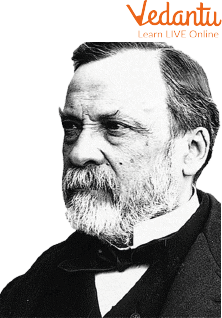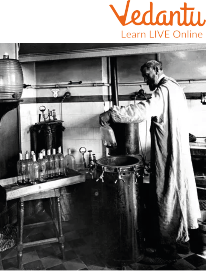




How Louis Pasteur Changed Science and Everyday Life
One of the most significant founders of medical microbiology was Louis Pasteur, a French chemist and microbiologist born in Dole, France on December 27, 1822. He passed away at Saint-Cloud on September 28, 1895. Pasteur made virtually one-of-a-kind contributions to science, technology, and medicine.
He established the pasteurisation procedure, preserved the French wine, beer, and silk industries, pioneered the study of molecular asymmetry, and more. He discovered that bacteria are the source of fermentation and disease, and created vaccinations for rabies and anthrax. Pasteur recognised that bacteria are causes of various diseases. He discovered the vaccination process.
Information About Louis Pasteur
Pasteur was admitted to the École Normale Supérieure (a teachers' institution in Paris) in 1843. There, he assisted Jean-Baptiste-André Dumas (a French chemist) in his classes and attended lectures given by the French chemist. In 1845, Pasteur earned his master's in science before going on to earn his doctorate in physical sciences. In 1848, Pasteur obtained a position as a professor of physics at the Lycée de Dijon, but he soon accepted a position as a professor of chemistry at the University of Strasbourg. He wed Marie Laurent, the daughter of the university rector, on May 29, 1849. Only two of the couple's five children made it through childhood.

Louis Pasteur
History of Louis Pasteur
In Dole, France, Pasteur was born as the middle child of five into a family of leather tanners. Up until the end of his secondary school years, the young Pasteur's abilities seemed to be more artistic than scholastic. He pursued intense studies to make up for his scholastic weaknesses in order to get ready for the École Normale Supérieure, the prestigious teachers' college in Paris, spurred on by the encouragement of his mentors. There, he received both his doctorate (1847) and his master's (1845) degrees.

Louis Pasteur Working
Pasteur continued to work as a lab assistant at the École Normale. There, he investigated the capacity of particular crystals or solutions to rotate plane-polarised light either clockwise or counterclockwise. He was able to demonstrate that this action had a connection with the composition of a compound's crystals. He also gave the reason that the molecules of such a substance had an "asymmetric" internal structure that was unique and responsible for twisting the light. This theory plays a significant role in the early development of structural chemistry, which is the branch of chemistry that examines the three-dimensional properties of molecules.
Pasteur had a similar perspective on the origin of diseases at the same time that he started studying fermentation. In the 1860s, Pasteur made an early excursion into the aetiology of certain diseases and was able to pinpoint the origin of the disastrous blight that had befallen the silkworms that were the backbone of France's silk industry.
Louis Pasteur Discoveries
Some of the most important discoveries of Louis Pasteur are:
Pasteurisation
Packaged and unpackaged food are subjected to a light heating procedure called pasteurisation, which typically involves temperatures of less than 100 °C (212 °F).
Cholera Vaccines
Vaccines against cholera are useful for preventing the disease. They offer about 85% protection for the first six months following immunisation, declining to 50% or 62 per cent throughout the first year. The amount of protection falls to less than 50% after two years.
Rabies Vaccine
A vaccination used to prevent rabies is the rabies vaccine. There are several rabies vaccines that are both reliable and secure. They can be used to stop the spread of the rabies virus, which is typically brought on by a dog bite or a bat bite, before and for a while after exposure.
Louis Pasteur Quotes
"Scientific knowledge is universal because it is the light that illuminates the entire human race, which transcends national boundaries. Because that country will continue to be the first to spread works of thinking and intelligence the farthest, science is the highest personification of the country.”
"Messieurs, it is the microbes who will have the ultimate word," is the correct translation of the line "Gentlemen, it is the germs who will have the final say."
“Effort: Let us be able to say, as we get closer to the big aim, I have done what I could, whether or not life favours our efforts.”
“Science draws people closer to God by increasing our understanding of the natural world and our awe of the Creator's handiwork.”
Interesting Facts About Louis Pasteur
Louis went on to teach chemistry at universities in France. He investigated the bacteria in food and beverages.
He discovered that milk's bacteria can be destroyed by heating. The term "pasteurisation" refers to this action. Today, it makes a lot of our meals safer.
Louis Pasteur developed the cholera, anthrax, smallpox, and rabies vaccinations.
Summary
Louis Pasteur, a French chemist and microbiologist (born December 27, 1822, Dole, France—died September 28, 1895), is regarded as one of the most important pioneers of medical microbiology. Pasteur made virtually one-of-a-kind contributions to science, technology, and medicine. He produced the anthrax and rabies vaccines, discovered that bacteria cause fermentation and disease, pioneered the study of molecular asymmetry, saved the French beer, wine, and silk industries, and more.
Pasteur had a large number of academic positions, and his scientific contributions gained him numerous honours including election to the Académie des Sciences and France's highest accolade, the Legion of Honor. Today, more than 30 institutes, as well as a staggering number of hospitals, schools, structures, and streets, bear his name—a distinction given to only a select few experts.
FAQs on Essential Facts About Louis Pasteur
1. Who discovered the rabies vaccine?
Louis Pasteur discovered the rabies vaccine. Joseph Meister, age 9, who had been severely attacked by a rabid dog two days prior, received the first of 14 daily injections of rabbit spinal cord suspensions containing increasingly inactivated rabies virus on July 6, 1885, from Louis Pasteur and his colleagues.
2. Why is Louis Pasteur known as the father of microbiology?
Louis Pasteur developed some of the first vaccines in human history as well as the pasteurisation technique (for which he shares the name). He was the first to demonstrate that microorganisms are the root cause of infectious diseases, refute the theory of spontaneous generation (the notion that microbes might grow out of thin air), and create the pasteurisation procedure. Hence, he is regarded as the father of microbiology.
3. What are some must-know facts about Louis Pasteur?
One of the founders of germ theory is Louis Pasteur.
The pasteurisation method was created by Louis Pasteur, who is well known for it.
Vaccines against rabies were first created by Louis Pasteur.
The silk business was saved in part by Louis Pasteur.
Some of his work was imitated by Louis Pasteur.









